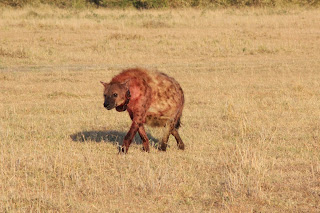(Blog post from H. Couraud)
Carcass sessions are one of the toughest times to be a research assistant (the number and activity level of the hyenas make it just about impossible to catch everything), but also one of the most interesting. Aggressions play out and you see a lot of personality and individuality regarding how hyenas behave in this high-intensity social and feeding scene.
A couple of the ways you see each hyena choose their own strategy is how they attain food (particularly if you're a low-ranker), and what they do when the activity has subsided. Here are just a few of the 'get food!' strategies and post-carcass session activities the hyenas will choose.
--Wait your turn. Because you know you have to anyways...
--Take what you can get. If you're an immigrant male, that more often than meat means organs, hooves, scraps, or horns.
 |
| Monrovia sneaks off with a wildebeest stomach 13May14 |
--Cache your scrap in water, to decrease the chance of another hyena smelling it, so you can come back later.
 |
| Kisumu, being sneaky |
--Play tug-of-war with someone who is lower-ranking than you are....like a leopard.
 |
| AL472 fights to gain control of the carcass |
 |
| Navajo, our oldest and lowest-ranking hyena, gnaws at the remains of a carcass |
 |
| Navajo 18Mar14 |
And then after you're all fed and satisfied, then what?
--Waddle away. (One little push and it could be a 'roll' away)
 |
| Adonis 04Mar14 |
 |
| Snaggletooth 13May14 |
 |
| Lucy Luciano sacked out near a pond 13May14 |
*All photos by H. Couraud, all all taken during or right after a carcass session we observed.





No comments:
Post a Comment